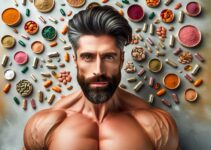You've probably heard about the countless topical treatments out there that claim to combat hair loss, but how do you know which ones actually work? With so many options on the market, it can be overwhelming to navigate through the sea of products. However, fear not, as we've done the research for you and compiled a comprehensive review of the top men's hair loss topical treatments. From over-the-counter options to prescription strength solutions and natural formulas, we'll break down the key ingredients, clinical evidence, and provide tips for choosing the right treatment for you.
Key Takeaways
- Hair loss in men can be caused by genetics, hormonal imbalances, and certain medical conditions.
- Maintaining a healthy diet and managing stress levels can help minimize the impact of hair loss.
- Topical treatments with key ingredients like minoxidil, finasteride, ketoconazole, and saw palmetto can effectively address hair loss.
- Consistency, following application instructions, and consulting with a healthcare professional are important for maximum efficacy of topical treatments.
Understanding Hair Loss in Men
If you're a man experiencing hair loss, understanding the underlying causes and potential treatments is essential for addressing the issue effectively. Hair loss in men can be caused by a variety of factors, including genetics, hormonal imbalances, and certain medical conditions. While it may not always be possible to prevent hair loss entirely, there are steps you can take to minimize its impact. Maintaining a healthy diet, managing stress levels, and avoiding harsh hair treatments can help to promote overall hair health and potentially slow down the rate of hair loss.
The psychological impact of hair loss in men should not be overlooked. It can lead to feelings of self-consciousness, low self-esteem, and even depression in some cases. Coping strategies such as seeking support from loved ones, considering therapy, or joining support groups can be beneficial in managing the emotional effects of hair loss. Additionally, focusing on aspects of yourself beyond physical appearance, such as talents, personality, and accomplishments, can help to build confidence and reduce the impact of hair loss on your self-image. Understanding the causes of hair loss and implementing prevention strategies, along with addressing the psychological impact and utilizing effective coping strategies, can help you navigate the challenges associated with hair loss.
Key Ingredients to Look for
When seeking topical treatments for hair loss, look for key ingredients such as minoxidil, finasteride, and ketoconazole to address the underlying causes effectively. These ingredients have been scientifically proven to promote hair growth and combat hair loss. Here are some key ingredients to look for in men's hair loss topical treatments:
- Minoxidil: This FDA-approved ingredient is known to stimulate hair growth by widening the hair follicles and prolonging the hair growth phase.
- Finasteride: A prescription medication that inhibits the production of dihydrotestosterone (DHT), a hormone linked to hair loss, thereby preventing further hair thinning.
- Ketoconazole: This antifungal ingredient has been found to have anti-androgenic properties, making it effective in treating hair loss related to androgenic alopecia.
- Saw Palmetto: Derived from the fruit of the Serenoa repens plant, saw palmetto is believed to block the activity of 5-alpha-reductase, an enzyme that converts testosterone to DHT, thus reducing hair loss.
How Topical Treatments Work
When it comes to understanding how topical treatments work for hair loss, it's important to consider the mechanism of action, application instructions, as well as the efficacy and results. Knowing how these treatments function, how to apply them correctly, and what kind of outcomes you can expect will give you a better understanding of their effectiveness. By focusing on these key points, you can make informed decisions about which topical treatments may be best suited for your needs.
Mechanism of Action
Topical treatments for men's hair loss work by directly targeting the hair follicles and promoting increased blood flow to the scalp. This mechanism of action helps to stimulate hair growth and prevent further hair loss. The active ingredients in these treatments penetrate the scalp to deliver nourishment to the hair follicles, revitalizing them and prolonging the hair growth cycle. By enhancing blood circulation, these topicals ensure that the follicles receive an adequate supply of nutrients and oxygen, which are essential for healthy hair growth. Additionally, some topical treatments contain DHT blockers to counteract the hormone responsible for hair thinning and loss. This comprehensive approach addresses the root causes of hair loss, making topical treatments an effective solution for many men.
- Direct targeting of the hair follicles
- Promotion of increased blood flow to the scalp
- Delivery of nourishment to the hair follicles
- Inclusion of DHT blockers
Application Instructions
To apply topical treatments effectively, gently part your hair and directly apply the product to your scalp, ensuring thorough coverage of the areas where hair loss is a concern. Proper application is crucial for the treatment to reach the hair follicles and deliver the intended benefits. Here are some best practices for applying topical treatments:
| Best Practices | Description |
|---|---|
| Clean Scalp | Ensure your scalp is clean and dry before applying the treatment. |
| Gentle Massage | After application, gently massage the product into your scalp for better absorption. |
| Consistent Usage | Use the topical treatment regularly as directed to maximize its effectiveness. |
| Avoid Overuse | Use the recommended amount and avoid over-application to prevent irritation. |
Following these best practices will help you achieve optimal results from your topical hair loss treatment.
Efficacy and Results
After applying topical treatments following the best practices for effective application, you may be curious about how these treatments work and their efficacy in addressing hair loss. Topical treatments work by penetrating the scalp to stimulate hair follicles and prevent the production of dihydrotestosterone, a hormone linked to hair loss. Efficacy comparison can be subjective as each individual's response to the treatment varies. User experiences often vary, with some reporting significant regrowth and thickening of hair, while others may experience more modest results. Factors such as genetic predisposition, age, and the underlying cause of hair loss can also influence the efficacy of topical treatments. It's important to manage expectations and consult with a healthcare professional to determine the most suitable treatment for your specific situation.
Popular Over-the-Counter Options
Now let's talk about the popular over-the-counter options for treating hair loss. You'll find out how effective these OTC treatments are and the application process for using them. Understanding these key points will help you make an informed decision about the best OTC option for you.
OTC Topical Effectiveness
Several over-the-counter topical treatments have shown promise in effectively addressing men's hair loss. However, it's important to consider the limitations of OTC topicals and explore alternative treatment options for optimal results. When considering OTC topical treatments, keep in mind the following:
- Efficacy varies: OTC topicals may not work for everyone due to differences in individual response.
- Consistency is key: Results may require consistent and long-term use of OTC topical treatments.
- Potential side effects: Some OTC topicals may cause skin irritation or other adverse reactions.
- Limited options: OTC topicals may offer limited active ingredients compared to prescription options.
If OTC topical treatments do not meet your needs, consult with a healthcare professional to explore alternative treatment options for managing hair loss.
OTC Application Process
If you're considering over-the-counter topical treatments for managing hair loss, understanding the application process of popular options is essential for achieving the best results. Here are some application techniques and product recommendations to help you make the most of these treatments:
| Product Name | Application Technique | Recommended Usage |
|---|---|---|
| Rogaine (Minoxidil) | Apply to dry scalp, massage in | Twice daily, morning and night |
| Nioxin Minoxidil | Apply to dry scalp, massage in | Once daily, preferably at night |
| Lipogaine | Apply to dry scalp, massage in | Twice daily, morning and night |
Following the recommended application techniques for these products can enhance their effectiveness. Remember, consistency is key when using over-the-counter topical treatments for hair loss.
Prescription Strength Solutions
Prescription strength solutions for men's hair loss can provide effective treatment options for those experiencing significant thinning or balding. If over-the-counter remedies have not yielded the desired results, prescription options may be the next step. It's important to consult with a healthcare professional to discuss the potential benefits and side effects of these stronger treatments.
When considering prescription strength solutions for hair loss, keep the following in mind:
- Consultation with a healthcare professional is crucial to assess the suitability of prescription options for your specific condition.
- Prescription strength solutions may have more potent active ingredients to target hair loss at a deeper level.
- It's essential to be aware of potential side effects and discuss any concerns with your healthcare provider.
- Regular follow-up appointments are necessary to monitor progress and assess any adverse reactions.
Natural and Organic Formulas
Considering natural and organic formulas for men's hair loss can offer a gentler alternative to prescription strength solutions, potentially catering to individuals seeking milder treatments with botanical ingredients. Natural hair care focuses on using plant-based ingredients, free from harsh chemicals, which could be beneficial for those with sensitive scalps. Organic hair products often contain herbal extracts and essential oils known for their nourishing and revitalizing properties, making them popular choices for those looking for holistic hair treatments. These remedies are designed to address hair loss using gentle, non-toxic hair care methods, promoting overall hair and scalp health. Herbal hair solutions harness the power of nature to stimulate hair follicles and improve circulation, aiding in the prevention of further hair loss. By opting for natural and organic formulas, you can embrace a more sustainable approach to hair care while effectively addressing your hair loss concerns. Whether it's through natural hair care, organic hair products, or holistic hair treatments, these options present a compelling case for individuals seeking a more gentle and environmentally friendly solution.
Clinical Studies and Evidence
Clinical trials have shown promising results for various topical treatments addressing men's hair loss. Scientific research has been conducted to evaluate the effectiveness of these treatments, providing clinical evidence of their benefits. Here are key findings from recent clinical studies:
- Minoxidil: A study published in the Journal of the American Academy of Dermatology demonstrated that minoxidil, when applied topically, effectively promotes hair regrowth in men with androgenetic alopecia.
- Finasteride: Clinical trials have indicated that finasteride, a topical medication, can significantly reduce hair loss and stimulate new hair growth in men experiencing male pattern baldness.
- Ketoconazole: Research has shown that ketoconazole, a common ingredient in hair loss shampoos, exhibits antifungal properties that may also help reduce inflammation and improve hair density in men with alopecia.
- Saw Palmetto: Studies have suggested that saw palmetto, when used topically, may inhibit the activity of 5-alpha reductase, an enzyme linked to hair loss, thus potentially contributing to the prevention of further hair thinning.
These findings highlight the value of topical treatments supported by clinical evidence and underscore their potential in addressing men's hair loss.
Tips for Choosing the Right Treatment
When selecting a topical treatment for hair loss, it's important to consider the specific needs and characteristics of your hair and scalp. To choose wisely, start by understanding your hair type, scalp condition, and the underlying cause of your hair loss. Consider factors such as the severity of your hair loss, any allergies or sensitivities, and your lifestyle. It's essential to compare different treatments available in the market to make an informed decision. Look for key ingredients that have been clinically proven to promote hair growth, such as minoxidil or finasteride. Additionally, consider the formulation of the product – whether it's a foam, serum, or shampoo. Read reviews and seek recommendations from trusted sources, but remember that what works for one person may not work for another. Keep in mind that consistency is key when using topical treatments, so choose a product that aligns with your daily routine and preferences. By carefully considering these factors and comparing available treatments, you can make an informed decision to address your hair loss concerns.
Frequently Asked Questions
Are There Any Potential Side Effects or Risks Associated With Using Topical Hair Loss Treatments for Men?
When using topical hair loss treatments, there are potential risks and side effects to consider. It's important to weigh these against the long-term effectiveness and consider combination therapy for best results.
Can Topical Hair Loss Treatments Be Used in Combination With Other Hair Loss Treatments, Such as Oral Medications or Laser Therapy?
You can use topical treatments in combination with oral medications or laser therapy for hair loss. Combining therapies can enhance effectiveness. However, it's important to consult with a healthcare professional to ensure safety and minimize potential interactions.
How Long Does It Typically Take to See Results From Using a Topical Hair Loss Treatment?
Typically, you may start seeing results from a topical hair loss treatment within a few months. Consistent and proper application is key. While it may vary, potential risks and long-term effectiveness should be considered when using these treatments.
Are There Any Specific Lifestyle Changes or Habits That Can Help Maximize the Effectiveness of Topical Hair Loss Treatments?
To maximize the effectiveness of topical hair loss treatments, consider making dietary changes and managing stress. Adding regular exercise and scalp massages can also help. These habits can create a healthy environment for your hair to thrive.
Are There Any Specific Hair Care Products or Styling Techniques That Should Be Avoided When Using Topical Hair Loss Treatments?
When using topical hair loss treatments, avoid harsh chemicals in hair care products. Stick to a proper haircare routine, and steer clear of styling techniques that cause excessive tension or damage to your hair.


